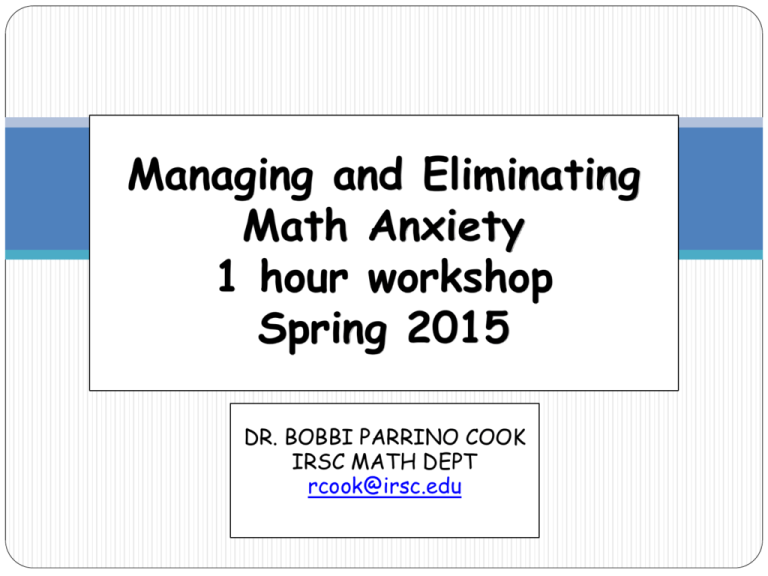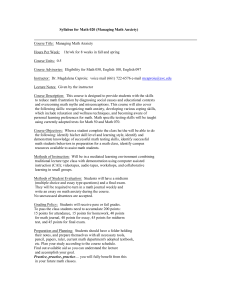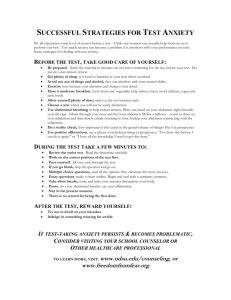
Managing and Eliminating
Math Anxiety
1 hour workshop
Spring 2015
DR. BOBBI PARRINO COOK
IRSC MATH DEPT
rcook@irsc.edu
MATH ANXIETY
IS THE NEGATIVE EMOTIONAL RESPONSE TO MATH
Math anxiety is a learned response.
It can be unlearned and replaced with
positive responses.
A positive experience when learning
mathematics
can change these feelings and
future success in math can be achieved.
Math Anxiety
What is Math Anxiety?
Math anxiety is an intense emotional feeling of anxiety that some
people have about their ability to understand and do mathematics.
People who suffer from math anxiety feel that they are incapable of
doing activities and classes that involve math. Some math anxious people
have a fear of math or math phobia.
Some students have even chosen their college major on the basis of how
little math is required for the degree.
Math anxiety is an emotional, rather than intellectual, problem.
However, math anxiety interferes with a person's ability to learn math
and therefore results in an intellectual problem.
“ The mind is not a vessel to be filled.
It is a fire to be kindled.”
Plutarch
What Causes Math Anxiety?
Math anxiety does not have a single cause.
Math anxiety is often the result of a student's
negative or embarrassing experiences with math in
the past.
Such an experiences can leave a student believing
that she or he is not capable of doing math.
This belief can actually result in poor performance,
which serves as confirming evidence to the student.
This phenomenon is known as the self-fulfilling
prophecy which means that math anxiety results in
poor performance rather than the reverse.
Math Myths
There are a number of erroneous beliefs about math
which contribute to students' fears, and anxiety about
math:
“Men are better in math than women” ; research has failed to
show any difference between the genders in math ability.
“There is a best way to do a math problem”;
actually, most math
problems can be solved a number of ways.
“Some people have a math mind and others don't”;
most
people are much more capable in math than they believe they are.
“It's bad to count on your fingers”;
actually, counting on fingers
actually indicated an understanding of arithmetic.
“Those good in math do problems quickly in their heads.”
Even math professors review example problems before teaching
them in class.
Math Anxiety Contributing Elements
Body and Mind
Physiological
•Rapid Heart Rate
•Sweating
•Muscle Tension
•Upset Stomach
•Shaking
Psychological
•Feeling Overwhelmed
•Low Self-Confidence
•Mind Goes Blank
•Procrastination
•Avoidance
Mind Games
Math anxiety is often perpetuated by a number of mind games that
students play on themselves.
I don't do math fast enough. People learn at different rates.
How fast one does math is not an indication of ability.
I don't have a math mind.
This belief interferes with one's real ability to learn math.
If I get it right, it must be too simple.
Math anxious students often discount their own abilities when
doing math problems.
Math is unrelated to my life.
Freeing yourself of the fear of math will help you to see how
math relates to all aspects of life.
MATHEMATICS IS DIFFERENT FROM
OTHER SUBJECTS
1
MATH IS A FOREIGN LANGUAGE
A.
It has its own vocabulary.
B.
The only way to get good at it is to practice regularly (daily).
2. MATH REQUIRES LINEAR LEARNING
A.
If you don’t get one chapter or lesson you will be lost on the next.
B.
Make sure that you have been placed in the correct level math class. When in doubt go lower
rather than higher.
3. WHEN YOU ARE IN A MATH CLASS…
A.
Be on time.
B.
Sit near the front.
C.
Arrive with text, notebook, pencil, completed homework assignment.
D.
Never miss a session—when you do you will set yourself actually two sessions behind.
E.
Read the section before you come to class.
F.
Ask question when you don’t understand (it’s your right and probably you are not the only one
who doesn’t understand).
G.
Take plenty of notes.
4. Read your notes immediately after class and then again about eight hours later.
5. Stay up to date on homework, don’t get behind.
6.
Get help as soon as you need it—don’t wait.
7. Get a study buddy.
Overcoming Math Anxiety
It's important to be familiar with the thoughts you have about
yourself and the situation when you encounter math
Anxiety can greatly interfere with concentration, clear thinking,
attention and memory. Students can learn relaxation techniques that
are very effective in controlling the emotional and physical
characteristics of anxiety that are interfering with mental
processing capabilities.
Learn positive self-talk. Giving yourself positive self-talk helps to
counter and overcome your belief in the math myths or to stop
playing mind games on yourself. Positive self-talk is effective in
replacing negative thoughts, which create anxiety with positive
thoughts that reduce anxiety.
Find out your learning styles. Having your learning style evaluated
can have a big influence on the quality of your learning. Your learning
style is like a fingerprint – everyone is different. There are over 20
categories of learning styles. Contact Dr. Cook if you have not been
evaluated and are interested in getting this done.
POWER POSES – 5 MINUTES
POSITIVE MATH AFFIRMATIONS
Every day my ability to do math is improving.
Deep inside me, I can see and experience myself relax while doing
math.
Deep within me, I can see and feel myself comfortable and
confident while in math class.
I can allow myself to remain comfortable, calm and confident while
doing math problems.
I can clearly visualize myself succeeding in math.
Deep down inside I know that I am truly capable and competent to
do math.
There are a number of positive behaviors, which
actually help students learn and perform better in
math classes:
First, sit near the front of the class where you will
experience fewer distractions and feel more a part of
what is being discussed.
Second, if you have questions, ask! Rest assured that
you are not the only one who has the same question
you want to ask. Don't be afraid to seek help from
your professor after class or during office hours.
Third, prepare! Read the textbook material before it
is discussed in class. Do the problems. Math skill
comes from practice and repetition.
After class, review the material covered as quickly as
possible and complete homework as quickly as possible
after class.
Ten Ways
To Reduce Math Anxiety
1. Overcome negative self-talk.
2. Ask questions.
3. Consider math a foreign language -- it must be
practiced.
4. Don't rely on memorization to study mathematics.
5. READ your math text
6. Study math according to YOUR LEARNING STYLE.
7. Get help the same day you don't understand.
8. Be relaxed and comfortable while studying math.
9. "TALK" mathematics.
10. Develop responsibility for your own successes and
failures.
All Contents Copyright©1997-2008
by Ellen Freedman, All Rights Reserved.
STUDYING MATHEMATICS
1.
Have a routine and have a planned time fixed in your schedule to study.
2. Have a specific location for doing math homework.
3. Limit study time to one hour and then take a break. Three one hour sessions is better than one three
hour session. If you can’t last that long try using a timer (in another room) for a shorter amount of
time and see if you can last until the timer rings and then take a break.
4. Allow about three hours homework time to one hour of class time.
5. Try to do math homework just about every day. If you are taking a night class, don’t plan on
completing your homework in one session.
6. Before starting review appropriate lecture notes.
7.
Write your homework neatly—be generous with the amount of room that you give to each problem on
each page.
8. Copy the problem from your textbook.
9. Show all steps right in the problem area.
10. Circle or in some way identify the final answer.
11. Write note cards for important concepts.
12. Keep up to date on your assignments—DON’T GET BEHIND!
13. If you get stuck on a problem: a) go to your class notes and look for a similar problem. b) review the
textbook for related information. c) look it up in another source. d) call your studybuddy. e) skip the
problem for now and get to the ASC lab or see your teacher preferably before class meets again.
14. Always finish study sessions on a positive note with a problem or two worked out successfully
Math anxiety has two aspects:
MENTAL AND PHYSICAL.
The PHYSICAL symptoms of math anxiety are
problems like sweaty palms, fast heartbeat, dry
mouth etc.
To combat physical symptoms practice relaxation
techniques.
The MENTAL symptoms are negative thoughts and
messages that enter our mind. As these thoughts
increase our ability to concentrate decreases.
To combat mental symptoms practice using positive
self talk.
WEBSITES WITH INFORMATION ON MATH ANXIETY:
http://www.mathpower.com
(Probably my favorite site – Dr. Freedman from Camden C.C. in NJ –
she has info on math anxiety and learning styles)
http://www2.roguecc.edu/mathematics/math%20anxiety/managing_
math_anxiety.htm
( Nice explanations and suggestions of things to do to battle math
anxiety)
http://www.nvcc.edu/alexandria/science/math/TipMath1.htm
(Tips on how to study math and take tests)
TEST TAKING STRATEGIES*
1.
MEMORY DATA DUMP
2. PREVIEW TEST
3. SECONDARY DATA DUMP
4. TEST PROGRESS SCHEDULE
5. ANSWER EASY QUESTIONS
6. SKIP DIFFICULT QUESTIONS
7. REVIEW SKIPPED QUESTIONS
8. GUESS AT REMAINING QUESTIONS
9. REVIEW ALL TEST
10. USE ALL THE TEST TIME
*from Winning At Math by Dr. Paul Nolting








